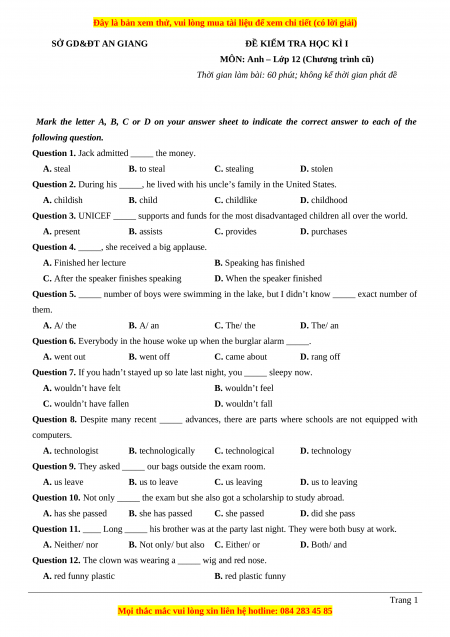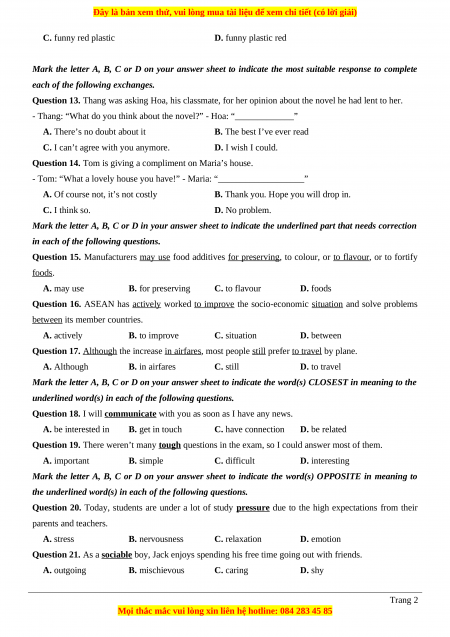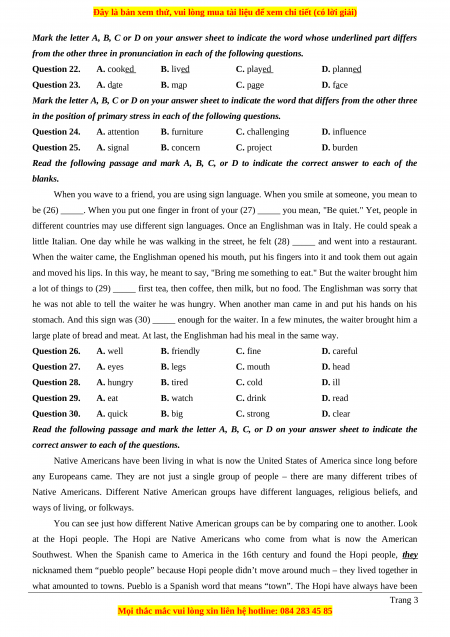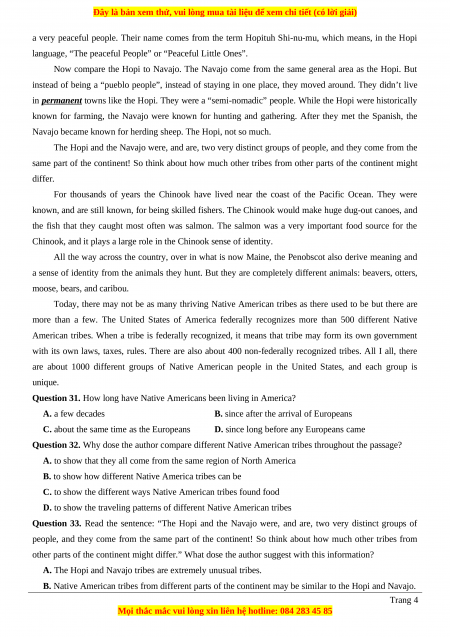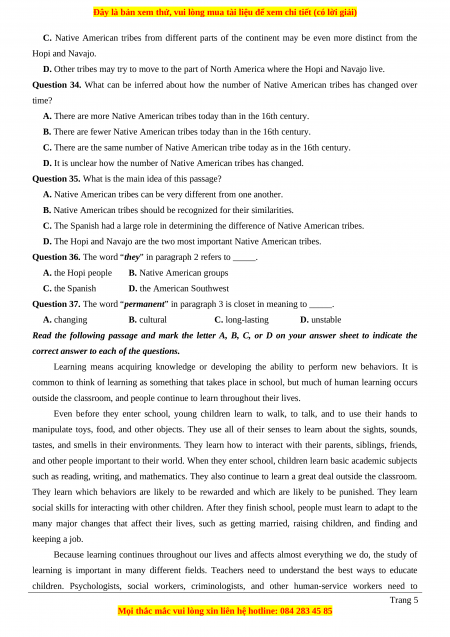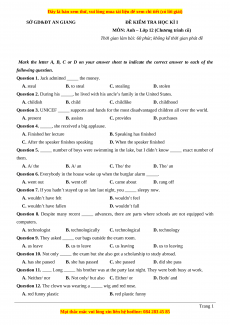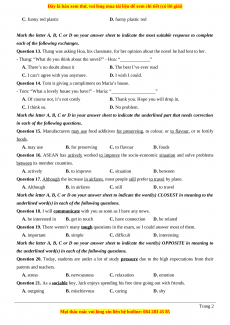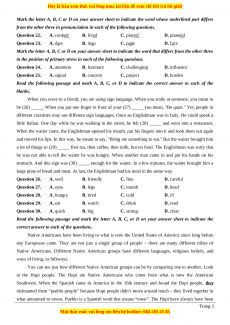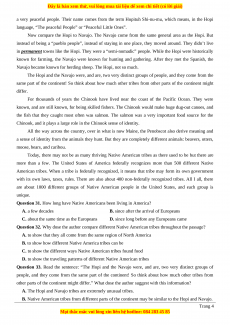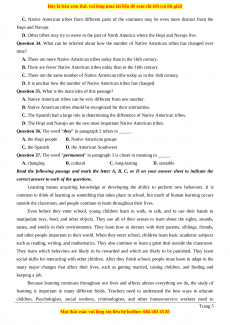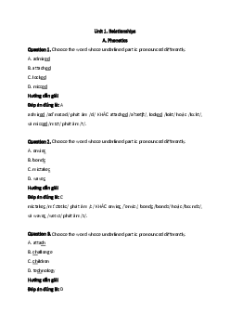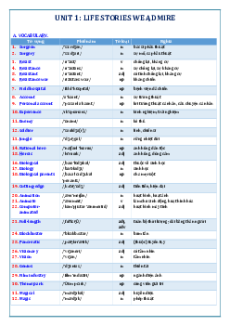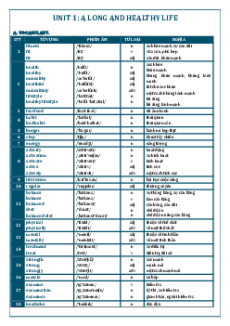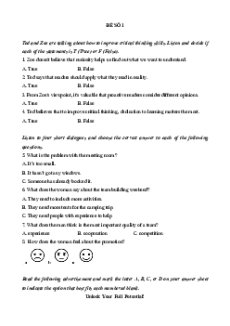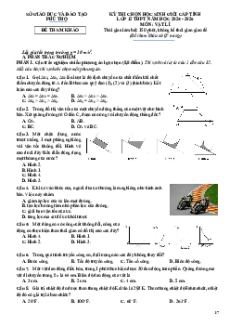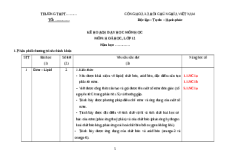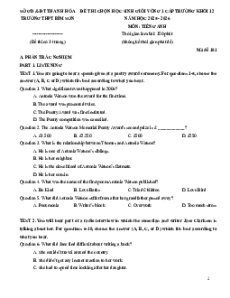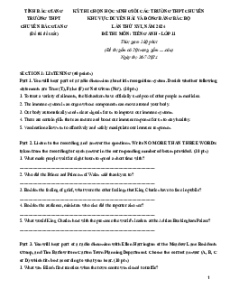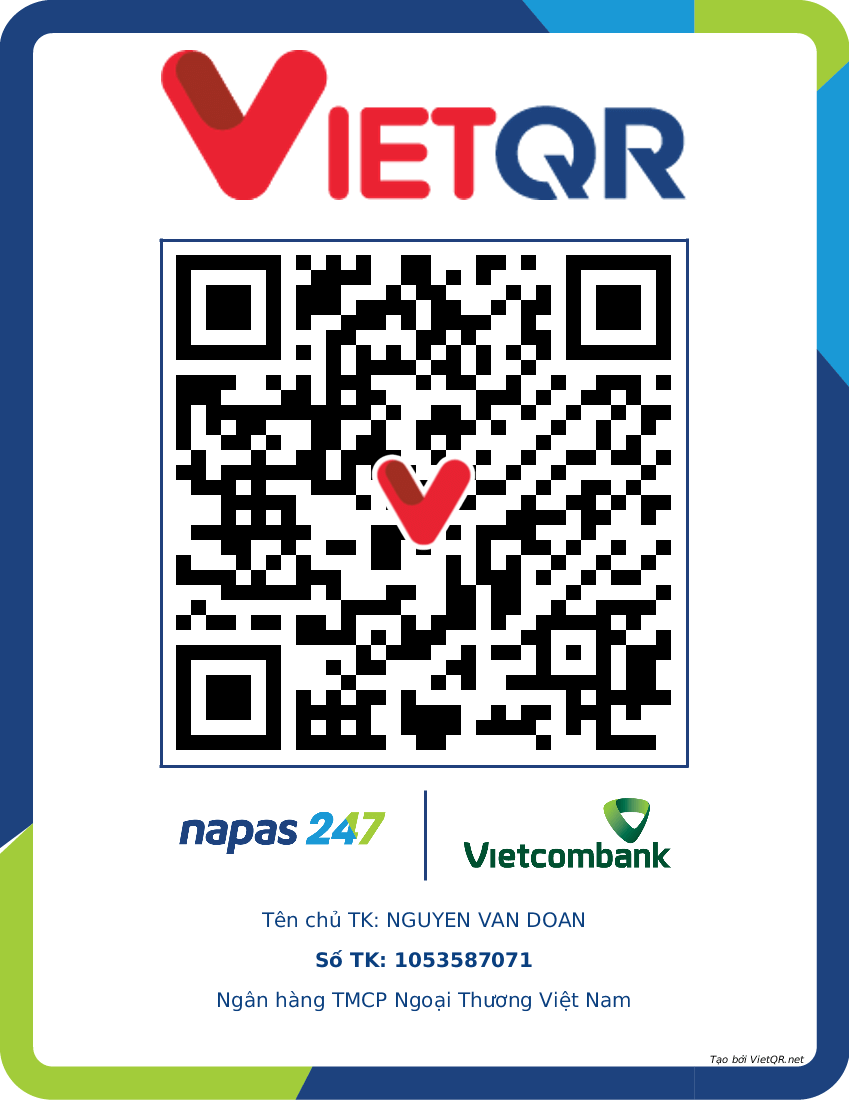SỞ GD&ĐT AN GIANG
ĐỀ KIỂM TRA HỌC KÌ I
MÔN: Anh – Lớp 12 (Chương trình cũ)
Thời gian làm bài: 60 phút; không kể thời gian phát đề
Mark the letter A, B, C or D on your answer sheet to indicate the correct answer to each of the
following question.
Question 1. Jack admitted _____ the money. A. steal B. to steal C. stealing D. stolen
Question 2. During his _____, he lived with his uncle’s family in the United States. A. childish B. child C. childlike D. childhood
Question 3. UNICEF _____ supports and funds for the most disadvantaged children all over the world. A. present B. assists C. provides D. purchases
Question 4. _____, she received a big applause.
A. Finished her lecture
B. Speaking has finished
C. After the speaker finishes speaking
D. When the speaker finished
Question 5. _____ number of boys were swimming in the lake, but I didn’t know _____ exact number of them. A. A/ the B. A/ an C. The/ the D. The/ an
Question 6. Everybody in the house woke up when the burglar alarm _____. A. went out B. went off C. came about D. rang off
Question 7. If you hadn’t stayed up so late last night, you _____ sleepy now.
A. wouldn’t have felt B. wouldn’t feel
C. wouldn’t have fallen D. wouldn’t fall
Question 8. Despite many recent _____ advances, there are parts where schools are not equipped with computers. A. technologist B. technologically C. technological D. technology
Question 9. They asked _____ our bags outside the exam room. A. us leave B. us to leave C. us leaving D. us to leaving
Question 10. Not only _____ the exam but she also got a scholarship to study abroad. A. has she passed B. she has passed C. she passed D. did she pass
Question 11. ____ Long _____ his brother was at the party last night. They were both busy at work. A. Neither/ nor
B. Not only/ but also C. Either/ or D. Both/ and
Question 12. The clown was wearing a _____ wig and red nose. A. red funny plastic B. red plastic funny Trang 1
C. funny red plastic D. funny plastic red
Mark the letter A, B, C or D on your answer sheet to indicate the most suitable response to complete
each of the following exchanges.
Question 13. Thang was asking Hoa, his classmate, for her opinion about the novel he had lent to her.
- Thang: “What do you think about the novel?” - Hoa: “_____________”
A. There’s no doubt about it
B. The best I’ve ever read
C. I can’t agree with you anymore. D. I wish I could.
Question 14. Tom is giving a compliment on Maria’s house.
- Tom: “What a lovely house you have!” - Maria: “___________________”
A. Of course not, it’s not costly
B. Thank you. Hope you will drop in. C. I think so. D. No problem.
Mark the letter A, B, C or D in your answer sheet to indicate the underlined part that needs correction
in each of the following questions.
Question 15. Manufacturers may use food additives for preserving, to colour, or to flavour, or to fortify foods. A. may use B. for preserving C. to flavour D. foods
Question 16. ASEAN has actively worked to improve the socio-economic situation and solve problems between its member countries. A. actively B. to improve C. situation D. between
Question 17. Although the increase in airfares, most people still prefer to travel by plane. A. Although B. in airfares C. still D. to travel
Mark the letter A, B, C or D on your answer sheet to indicate the word(s) CLOSEST in meaning to the
underlined word(s) in each of the following questions.
Question 18. I will communicate with you as soon as I have any news. A. be interested in B. get in touch C. have connection D. be related
Question 19. There weren’t many tough questions in the exam, so I could answer most of them. A. important B. simple C. difficult D. interesting
Mark the letter A, B, C or D on your answer sheet to indicate the word(s) OPPOSITE in meaning to
the underlined word(s) in each of the following questions.
Question 20. Today, students are under a lot of study pressure due to the high expectations from their parents and teachers. A. stress B. nervousness C. relaxation D. emotion
Question 21. As a sociable boy, Jack enjoys spending his free time going out with friends. A. outgoing B. mischievous C. caring D. shy Trang 2
Mark the letter A, B, C or D on your answer sheet to indicate the word whose underlined part differs
from the other three in pronunciation in each of the following questions. Question 22. A. cooked B. lived C. played D. planned Question 23. A. date B. map C. page D. face
Mark the letter A, B, C or D on your answer sheet to indicate the word that differs from the other three
in the position of primary stress in each of the following questions. Question 24. A. attention B. furniture C. challenging D. influence Question 25. A. signal B. concern C. project D. burden
Read the following passage and mark A, B, C, or D to indicate the correct answer to each of the blanks.
When you wave to a friend, you are using sign language. When you smile at someone, you mean to
be (26) _____. When you put one finger in front of your (27) _____ you mean, "Be quiet." Yet, people in
different countries may use different sign languages. Once an Englishman was in Italy. He could speak a
little Italian. One day while he was walking in the street, he felt (28) _____ and went into a restaurant.
When the waiter came, the Englishman opened his mouth, put his fingers into it and took them out again
and moved his lips. In this way, he meant to say, "Bring me something to eat." But the waiter brought him
a lot of things to (29) _____ first tea, then coffee, then milk, but no food. The Englishman was sorry that
he was not able to tell the waiter he was hungry. When another man came in and put his hands on his
stomach. And this sign was (30) _____ enough for the waiter. In a few minutes, the waiter brought him a
large plate of bread and meat. At last, the Englishman had his meal in the same way. Question 26. A. well B. friendly C. fine D. careful Question 27. A. eyes B. legs C. mouth D. head Question 28. A. hungry B. tired C. cold D. ill Question 29. A. eat B. watch C. drink D. read Question 30. A. quick B. big C. strong D. clear
Read the following passage and mark the letter A, B, C, or D on your answer sheet to indicate the
correct answer to each of the questions.
Native Americans have been living in what is now the United States of America since long before
any Europeans came. They are not just a single group of people – there are many different tribes of
Native Americans. Different Native American groups have different languages, religious beliefs, and ways of living, or folkways.
You can see just how different Native American groups can be by comparing one to another. Look
at the Hopi people. The Hopi are Native Americans who come from what is now the American
Southwest. When the Spanish came to America in the 16th century and found the Hopi people, they
nicknamed them “pueblo people” because Hopi people didn’t move around much – they lived together in
what amounted to towns. Pueblo is a Spanish word that means “town”. The Hopi have always have been Trang 3
a very peaceful people. Their name comes from the term Hopituh Shi-nu-mu, which means, in the Hopi
language, “The peaceful People” or “Peaceful Little Ones”.
Now compare the Hopi to Navajo. The Navajo come from the same general area as the Hopi. But
instead of being a “pueblo people”, instead of staying in one place, they moved around. They didn’t live
in permanent towns like the Hopi. They were a “semi-nomadic” people. While the Hopi were historically
known for farming, the Navajo were known for hunting and gathering. After they met the Spanish, the
Navajo became known for herding sheep. The Hopi, not so much.
The Hopi and the Navajo were, and are, two very distinct groups of people, and they come from the
same part of the continent! So think about how much other tribes from other parts of the continent might differ.
For thousands of years the Chinook have lived near the coast of the Pacific Ocean. They were
known, and are still known, for being skilled fishers. The Chinook would make huge dug-out canoes, and
the fish that they caught most often was salmon. The salmon was a very important food source for the
Chinook, and it plays a large role in the Chinook sense of identity.
All the way across the country, over in what is now Maine, the Penobscot also derive meaning and
a sense of identity from the animals they hunt. But they are completely different animals: beavers, otters, moose, bears, and caribou.
Today, there may not be as many thriving Native American tribes as there used to be but there are
more than a few. The United States of America federally recognizes more than 500 different Native
American tribes. When a tribe is federally recognized, it means that tribe may form its own government
with its own laws, taxes, rules. There are also about 400 non-federally recognized tribes. All I all, there
are about 1000 different groups of Native American people in the United States, and each group is unique.
Question 31. How long have Native Americans been living in America? A. a few decades
B. since after the arrival of Europeans
C. about the same time as the Europeans
D. since long before any Europeans came
Question 32. Why dose the author compare different Native American tribes throughout the passage?
A. to show that they all come from the same region of North America
B. to show how different Native America tribes can be
C. to show the different ways Native American tribes found food
D. to show the traveling patterns of different Native American tribes
Question 33. Read the sentence: “The Hopi and the Navajo were, and are, two very distinct groups of
people, and they come from the same part of the continent! So think about how much other tribes from
other parts of the continent might differ.” What dose the author suggest with this information?
A. The Hopi and Navajo tribes are extremely unusual tribes.
B. Native American tribes from different parts of the continent may be similar to the Hopi and Navajo. Trang 4
Đề thi học kì 1 Tiếng anh 12 năm 2022 - 2023 (Đề 14)
CÁCH MUA:
- B1: Gửi phí vào TK:
1133836868- CT TNHH DAU TU VA DV GD VIETJACK - Ngân hàng MB (QR) - B2: Nhắn tin tới Zalo VietJack Official ( nhấn vào đây ) để xác nhận thanh toán và tải tài liệu - giáo án
Liên hệ ngay Hotline hỗ trợ: 084 283 45 85
Đề thi được cập nhật liên tục trong gói này từ nay đến hết tháng 6/2023. Chúng tôi đảm bảo đủ số lượng đề đã cam kết hoặc có thể nhiều hơn, tất cả có BẢN WORD, LỜI GIẢI CHI TIẾT và tải về dễ dàng.
Để tải tài liệu gốc về máy bạn click vào nút Tải Xuống ở trên!
Thuộc bộ (mua theo bộ để tiết kiệm hơn):
-
Tailieugiaovien.com.vn giới thiệu bộ 21 đề thi học kì 1 môn Tiếng Anh lớp 12 mới nhất năm 2022 - 2023 nhằm giúp Giáo viên có thêm tài liệu tham khảo ra đề thi Tiếng anh lớp 12.
-
File word có lời giải chi tiết 100%.
-
Mua trọn bộ sẽ tiết kiệm hơn tải lẻ 50%.
Đánh giá
4.6 / 5(483 )Trọng Bình
Giúp ích cho tôi rất nhiều
Duy Trần
Rất thích tài liệu bên VJ soạn (bám sát chương trình dạy)
TÀI LIỆU BỘ BÁN CHẠY MÔN Tiếng Anh
Xem thêmTÀI LIỆU BỘ BÁN CHẠY Lớp 12
Xem thêmTài liệu bộ mới nhất





